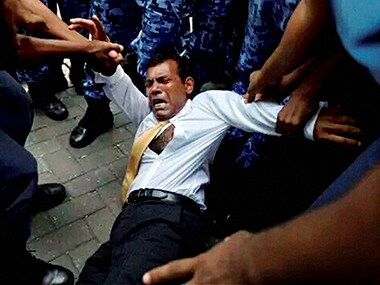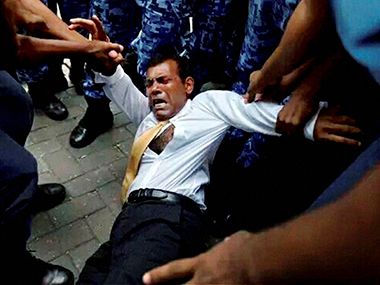Exactly two months after Maldivian former president Mohammed Nasheed was arrested on terrorism charges, Maldives continues to be a major foreign policy challenge for India. Nasheed was sentenced to 13 years in prison on terrorism charges on 13 March following an unusually fast-paced trial which Amnesty International has dubbed as “manifestly unfair.” Various stakeholders have time and again accused the Indian government, led by Prime Minister Narendra Modi, of adopting similar “only watch, but no action” policy. The fast-spreading impression is that the Modi government is as indecisive and unusually cautious as the previous Manmohan Singh government was. [caption id=“attachment_2210600” align=“alignleft” width=“380” class=" “]
 File image for former President of Maldives Mohammad Nasheed. PTI[/caption] It was the Manmohan Singh government that had “allowed” Maldives to slip away from the Indian sphere of influence as New Delhi’s wishes were no longer diktats when the present Maldivian crisis first exploded in 2012. But the Modi government too is no different and has maintained similar stony silence over Maldives. Many Maldives-watchers had expected the new government led by a strongman like Modi to act differently, decisively and determinedly. But the expectations have not matched with concrete actions as far as PM Modi’s Maldives policy is concerned. One hopes that the just-released report of international watchdog Amnesty International would nudge the Modi government to take a call on the situation in Maldives, a country where China and Pakistan continue to make deep strategic and diplomatic furrows at the expense of India. In a nut shell, the Amnesty has said that the Nasheed trial was a farce and India must intervene in Maldives at the earliest. In probably a one of its kind on-the-spot assessment report on Maldives, the Amnesty International said on 23 April that human rights are in free fall in Maldives and India should intervene at the earliest… The human rights situation in the Maldives is deteriorating alarmingly as authorities are muzzling peaceful protesters, silencing critical media and civil society, while abusing the judicial system to imprison opposition politicians… The international community especially influential neighbours such as India should engage the Maldivian authorities to improve and protect human rights.” The Amnesty report, based on a five-day fact finding mission to Maldives (17 to 22 April 2015), when an Amnesty International delegation interviewed lawyers, human rights defenders, journalists and political activists, has concluded that “a climate of fear” prevails in Maldives as safeguards on human rights are increasingly eroded. “The authorities have a growing track record of silencing critical voices by any means necessary – be it through the police, the judicial system, or outright threats and harassment. This must end immediately,” it said. Raghu Menon, Amnesty International India’s Advocacy Coordinator, who was part of the fact finding mission, remarked thus: “As an influential neighbour and an important regional power India has a responsibility to work towards a human rights-friendly environment in the Maldives. A favourable human rights environment is essential for strengthening democratic processes in the Maldives.” Unsurprisingly, the Amnesty delegation was completely cold shouldered by the Yameen government and was was unable to meet with a single government official during this visit. Amnesty International investigated the trials of Nasheed and two other imprisoned high-profile opposition politicians, former defence minister Mohamed Nazim and MP Ahmed Nazim, and has concluded that in all the three cases, “the right to a fair trial has been seriously undermined, and the Maldives authorities appeared to use the judiciary to pursue their own political goals.” Abbas Faiz, Amnesty International’s Maldives Researcher, told the media after the outfit released its report on Maldives that Nasheed was far from the only one locked up on trumped-up charges and after sham trials. “It is disturbing how far the Maldives government has co-opted the judiciary as a tool to cement its own hold on power,” Abbas Faiz said. The Amnesty has also said that international community cannot turn a blind eye to what is happening in Maldives and the upcoming UN UPR session in Geneva in May is a key moment to push the Maldives authorities to immediately take concrete action to improve the country’s human rights situation. It is highly unlikely that the Amnesty report would change the Modi government’s Maldives policy. Many would say that the only Maldives policy of the Modi government is to have no policy at all! Modi was to visit Maldives as part of his tour to Indian Ocean states last month but canceled it at the last minute as the Yameen government refused to yield an inch from its well known hard position on Nasheed despite the best of back-channel efforts by India. The situation continues to be the same and may aggravate as the Yameen government may well harden its stance on Nasheed. The Yameen government must have figured by now that India does not want to be seen as interventionist, hegemonic power. More so after the Sri Lanka episode wherein China-friendly Mahinda Rajapakse was shown the door and Maithripala Sirisena was elected in the presidential elections in January this year.
File image for former President of Maldives Mohammad Nasheed. PTI[/caption] It was the Manmohan Singh government that had “allowed” Maldives to slip away from the Indian sphere of influence as New Delhi’s wishes were no longer diktats when the present Maldivian crisis first exploded in 2012. But the Modi government too is no different and has maintained similar stony silence over Maldives. Many Maldives-watchers had expected the new government led by a strongman like Modi to act differently, decisively and determinedly. But the expectations have not matched with concrete actions as far as PM Modi’s Maldives policy is concerned. One hopes that the just-released report of international watchdog Amnesty International would nudge the Modi government to take a call on the situation in Maldives, a country where China and Pakistan continue to make deep strategic and diplomatic furrows at the expense of India. In a nut shell, the Amnesty has said that the Nasheed trial was a farce and India must intervene in Maldives at the earliest. In probably a one of its kind on-the-spot assessment report on Maldives, the Amnesty International said on 23 April that human rights are in free fall in Maldives and India should intervene at the earliest… The human rights situation in the Maldives is deteriorating alarmingly as authorities are muzzling peaceful protesters, silencing critical media and civil society, while abusing the judicial system to imprison opposition politicians… The international community especially influential neighbours such as India should engage the Maldivian authorities to improve and protect human rights.” The Amnesty report, based on a five-day fact finding mission to Maldives (17 to 22 April 2015), when an Amnesty International delegation interviewed lawyers, human rights defenders, journalists and political activists, has concluded that “a climate of fear” prevails in Maldives as safeguards on human rights are increasingly eroded. “The authorities have a growing track record of silencing critical voices by any means necessary – be it through the police, the judicial system, or outright threats and harassment. This must end immediately,” it said. Raghu Menon, Amnesty International India’s Advocacy Coordinator, who was part of the fact finding mission, remarked thus: “As an influential neighbour and an important regional power India has a responsibility to work towards a human rights-friendly environment in the Maldives. A favourable human rights environment is essential for strengthening democratic processes in the Maldives.” Unsurprisingly, the Amnesty delegation was completely cold shouldered by the Yameen government and was was unable to meet with a single government official during this visit. Amnesty International investigated the trials of Nasheed and two other imprisoned high-profile opposition politicians, former defence minister Mohamed Nazim and MP Ahmed Nazim, and has concluded that in all the three cases, “the right to a fair trial has been seriously undermined, and the Maldives authorities appeared to use the judiciary to pursue their own political goals.” Abbas Faiz, Amnesty International’s Maldives Researcher, told the media after the outfit released its report on Maldives that Nasheed was far from the only one locked up on trumped-up charges and after sham trials. “It is disturbing how far the Maldives government has co-opted the judiciary as a tool to cement its own hold on power,” Abbas Faiz said. The Amnesty has also said that international community cannot turn a blind eye to what is happening in Maldives and the upcoming UN UPR session in Geneva in May is a key moment to push the Maldives authorities to immediately take concrete action to improve the country’s human rights situation. It is highly unlikely that the Amnesty report would change the Modi government’s Maldives policy. Many would say that the only Maldives policy of the Modi government is to have no policy at all! Modi was to visit Maldives as part of his tour to Indian Ocean states last month but canceled it at the last minute as the Yameen government refused to yield an inch from its well known hard position on Nasheed despite the best of back-channel efforts by India. The situation continues to be the same and may aggravate as the Yameen government may well harden its stance on Nasheed. The Yameen government must have figured by now that India does not want to be seen as interventionist, hegemonic power. More so after the Sri Lanka episode wherein China-friendly Mahinda Rajapakse was shown the door and Maithripala Sirisena was elected in the presidential elections in January this year.
Consulting Editor, First Post. Strategic analyst. Political commentator. Twitter handle @Kishkindha.
)